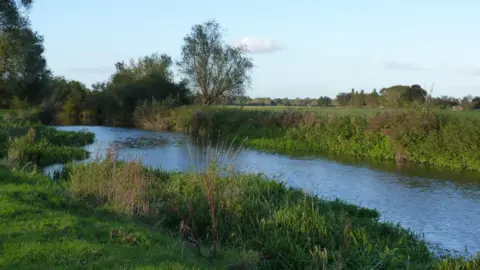Charity to manage meadows that inspired Pink Floyd
 NICK MARCUS/BBC
NICK MARCUS/BBCA conservation charity has taken on the management of an open space that has featured in poems and songs.
Cambridge Past, Present & Future (CPPF) said it had signed an agreement to look after Grantchester Meadows so it could be "improved for the benefit of nature, the environment and people".
The 50-acre site on the banks of the River Cam between Cambridge and Grantchester - where cows graze as punts meander on the water - is owned by King's College.
Popular with picnickers and wild swimmers, it inspired the 1959 Sylvia Plath poem "Watercolour of Grantchester Meadows" and the 1969 Pink Floyd track "Grantchester Meadows".
CPPF, which aims to protect Cambridge's green spaces and historic buildings and ensure development is carried out responsibly, already manages Wandlebury Country Park, Coton Countryside Reserve and Barnwell Meadows.
The charity said it made "perfect sense" to take on responsibility for Grantchester Meadows.
CPPF owns Skater's Meadow, at the northern end of the land, and has raised funds to take out covenants on King's College's land to protect it from possible development.
CPPF said it had helped stop a ring road being built through the meadows in the 1930s.
Bloomsbury Group
CPPF announced it had also been bequeathed The Orchard Tea Garden, in Grantchester, by its former owner, Robert Callan.
It was where writers, intellectuals and artists who later became known as The Bloomsbury Group met in the 1920s.
Members included Virginia Woolf, John Maynard Keynes and E.M. Forster.
The café will continue to be run by Orchard Tea Garden Ltd under lease.
It plans refurbishments "taking inspiration from the Bloomsbury Group" and particularly their summer retreat, Charleston House in East Sussex.
 Getty Images
Getty ImagesA spokesperson for the charity said it was not planning any "drastic" changes to the meadows, but would aim to protect the riverbanks as visitor numbers increase.
It will also have park wardens at busy times.
The charity's estate manager, Allan Scott-Davies, said: "We intend to work with the communities in Newnham and Grantchester, as well as user groups, to better understand some of the problems and to work with them to develop a longer-term plan for how the meadows could be improved for nature and the environment.
"Once we have that plan, we can start implementing the changes with the support of the people of Cambridge and King's College."
Swimming 'at own risk'
In 2021, the college attempted to ban wild swimming at the beauty spot, sparking a petition calling for public consultation that got 10,000 signatures in just two days.
The college later said it would not enforce the ban.
CPPF said swimmers enter the water at their own risk.
It said it would put up signs about the dangers, including infection and drowning.
A spokesperson for King's College said CPPF's "commitment to nature and working with local residents ensures that they will be effective stewards of one of the city's treasured green spaces".
Follow Cambridgeshire news on BBC Sounds, Facebook, Instagram and X.
